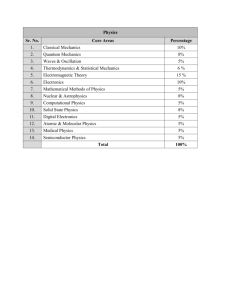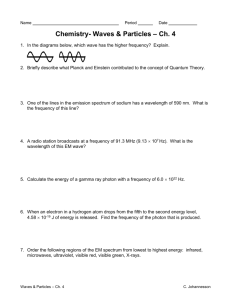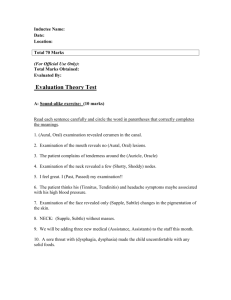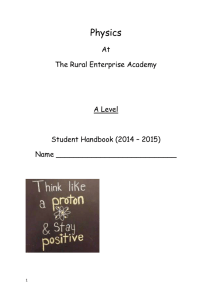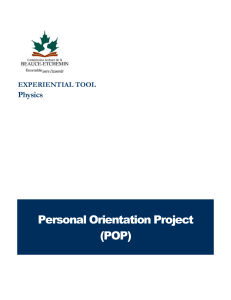Unit 3 - PHA3T Investigative and practical skills in AS Physics
advertisement
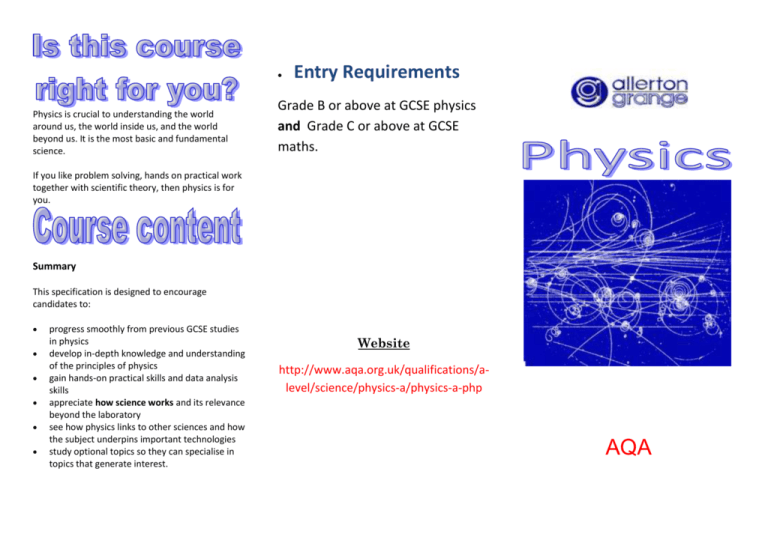
Physics is crucial to understanding the world around us, the world inside us, and the world beyond us. It is the most basic and fundamental science. Entry Requirements Grade B or above at GCSE physics and Grade C or above at GCSE maths. If you like problem solving, hands on practical work together with scientific theory, then physics is for you. Summary This specification is designed to encourage candidates to: progress smoothly from previous GCSE studies in physics develop in-depth knowledge and understanding of the principles of physics gain hands-on practical skills and data analysis skills appreciate how science works and its relevance beyond the laboratory see how physics links to other sciences and how the subject underpins important technologies study optional topics so they can specialise in topics that generate interest. Website http://www.aqa.org.uk/qualifications/alevel/science/physics-a/physics-a-php AQA AS Unit 1 Particles, Quantum Phenomena and Electricity Particles and Radiation, Constituents of the atom, Stable and unstable nuclei, Particles, antiparticles and photons, Particle interactions, Classification of particles, Quarks and antiquarks, Electromagnetic Radiation and Quantum Phenomena, The photoelectric effect, Collisions of electrons with atoms, Energy levels and photon emission, Wave-particle duality, Current Electricity, Charge, current and potential difference, Current / voltage characteristics, Resistivity, Circuits, Potential divider, Electromotive force and internal resistance, Alternating currents, Oscilloscope Unit 2 Mechanics, Materials and Waves Scalars and vectors, Moments, Motion along a straight line, Newton’s laws of motion, Work, energy and power, Conservation of energy, Materials, Bulk properties of solids, The Young modulus, Waves, Progressive Waves, Longitudinal and transverse waves, Refraction at a plane surface, Superposition of waves, stationary waves, Interference, Diffraction Unit 3 Investigative and Practical Skills A2 Unit 4 Fields and Further Mechanics Further Mechanics, Momentum concepts, Circular motion, Simple harmonic motion, Simple harmonic systems, Forced vibrations and resonance, Gravitation, Newton’s law, Gravitational field strength, Gravitational potential, Orbits of planets and satellites, Electric Fields, Coulomb’s law, Electric field strength, Electric potential, Electric potential, Comparison of electric and gravitational fields, Capacitance, Energy stored by a capacitor, Capacitor discharge, Magnetic Fields, Magnetic flux density, Moving charges in a magnetic field, Magnetic flux and flux linkage, Electromagnetic induction Unit 5 Nuclear Physics, Thermal Physics and an Optional Topic Evidence for the nucleus, α, β and γ radiation, Radioactive decay, Nuclear instability, Nuclear radius, Nuclear Energy, Mass and energy, Induced fission, Safety aspects, Thermal Physics, Thermal energy, Ideal gases, Molecular kinetic theory model Optional Topic: A Astronomy and cosmology, B Medical Physics, C Applied Physics, D Turning Points in Physics.AS Written Examination – 1¾ hours Section A: Nuclear and Thermal Physics – 40 marks Compulsory section 4/5 structured questions Section B: one of the following options. Each paper has 4/5 structured questions and 35 marks. 20% of the total A Level marks (Section A 10%, Section B 10%) Unit 6 PHA6T - Investigative and practical skills in A2 Physics Practical Skills Assessment Investigative Skills Assignment 10% of the total A Level marks Unit 6 Investigative and Practical Skills. AS Examination Unit 1 – PHYA1 Particles, quantum phenomena and electricity Written Examination – 6 or 7 structured questions 1¼ hours 40% of the total AS marks Unit 2 – PHYA2 Mechanics, materials and waves Written Examination – 6 or 7 structured questions 1¼ hours 40% of the total AS marks Unit 3 - PHA3T Investigative and practical skills in AS Physics Practical Skills Assignment Investigative Skills Assignment 20% of the total AS marks Unit 4 – PHYA4 Fields and further mechanics Written Examination –1¾ hours Section A is 25 multiple choice questions Section B is a written paper of 4/5 structured questions 20% of the total A Level marks Unit 5 – One of Units PHA5A, PHA5B, PHA5C, PHA5D Physicists are problem solvers. Their analytical skills make physicists versatile and adaptable so they work in interesting places. You can find physicists in industrial and government labs, on university campuses, in the space programme, and consulting on TV shows. In addition, many physics graduates work in government, and in the financial sector—places where their ability to think analytically is a great asset. Physics is a great foundation for careers in: Journalism Law Finance Medicine Engineering Computer Science Astronomy Biology Even when the job market is slow, physicists get job offers—well paying jobs. Employers know that a physicist brings additional skills with expertise and pay accordingly. That's why physicists can expect career salaries similar to those of computer scientists and engineers.


